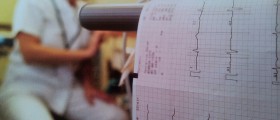
Congestive heart failure (also known as CHF, CCF, congestive cardiac failure or heart failure) is a medical condition affecting the human heart. People suffering from this condition have trouble since their heart is not able to pump sufficient amounts of blood and reach different parts of the body.
What are CHF Consequences?
As a result of inadequate function of the heart, patients experience retention of fluid, edemas and some other medical problems related to these symptoms. Swelling of the legs and ankles is frequently seen in CHF patients, as well as retention of fluid in the lungs (pulmonary edema), in the liver or intestine.
Untreated CHF may affect every organ in the body and this condition is considered to be the leading cause of hospitalization in people older than 65 years of age. About 10% of these cases have been known to end lethally, regardless the treatment.
Causes of CHF
Congestive heart failure may be caused by coronary artery disease, hypertension, myocardial infarction or heart valve impairment. Doctors have also identified some congenital heart defects, endocarditis and myocarditis as potential causes of CHF.
CHF Treatment Options
Doctors determine the treatment of heart failure according to the stage of the disease and general health of each patient. In most early stages, CHF is treated with medications, especially with ACE (angiotensin-converting enzyme) inhibitors, beta blockers and digitalis. These drugs have often been combined with diuretic medications.
If heart failure is initially a consequence of some other medical problem, doctors will also prescribe certain drugs for that condition, in order to cure the underlying cause of CHF. All medications prescribed by doctors should be used as they are prescribed. Anti-inflammatory drugs may not be suitable for some patients and unless your doctor tells you differently, these drugs should be avoided.
For patients whose CHF is caused by an abnormality of the heart valves, the problem needs to be treated surgically, by replacing or repairing the affected valve. Narrowed coronary arteries are also treated with surgical procedures and some patients may need pacemaker implants. Extremely severe cases of CHF may require a heart transplant.
Another option or additional treatment for patients suffering from congestive heart failure is natural treatment. This includes special diet regime with low sodium and low fat intake and limitations regarding caffeine and alcohol consumption. These patients are also advised to stop smoking instantly and lead an active life, with plenty of regular physical activity. All these measures of natural treatment are known to significantly improve the life of patients diagnosed with congestive heart failure.

















Your thoughts on this
Loading...